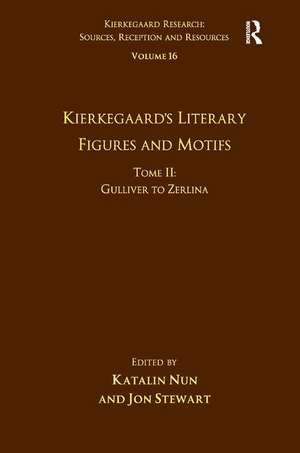Volume 16, Tome II: Kierkegaard's Literary Figures and Motifs: Gulliver to Zerlina: Kierkegaard Research: Sources, Reception and Resources
Autor Katalin Nun, Jon Stewarten Limba Engleză Hardback – 13 ian 2015
| Toate formatele și edițiile | Preț | Express |
|---|---|---|
| Paperback (1) | 388.13 lei 6-8 săpt. | |
| Taylor & Francis – 30 iun 2021 | 388.13 lei 6-8 săpt. | |
| Hardback (1) | 767.80 lei 6-8 săpt. | |
| Taylor & Francis – 13 ian 2015 | 767.80 lei 6-8 săpt. |
Din seria Kierkegaard Research: Sources, Reception and Resources
-
 Preț: 310.71 lei
Preț: 310.71 lei -
 Preț: 386.77 lei
Preț: 386.77 lei - 18%
 Preț: 1055.21 lei
Preț: 1055.21 lei - 18%
 Preț: 1065.78 lei
Preț: 1065.78 lei - 26%
 Preț: 820.71 lei
Preț: 820.71 lei - 18%
 Preț: 1064.19 lei
Preț: 1064.19 lei - 18%
 Preț: 1060.87 lei
Preț: 1060.87 lei - 25%
 Preț: 826.15 lei
Preț: 826.15 lei - 18%
 Preț: 1065.96 lei
Preț: 1065.96 lei -
 Preț: 469.34 lei
Preț: 469.34 lei - 18%
 Preț: 1056.95 lei
Preț: 1056.95 lei - 15%
 Preț: 703.76 lei
Preț: 703.76 lei - 18%
 Preț: 1117.49 lei
Preț: 1117.49 lei - 18%
 Preț: 1054.71 lei
Preț: 1054.71 lei - 18%
 Preț: 1116.27 lei
Preț: 1116.27 lei -
 Preț: 381.28 lei
Preț: 381.28 lei - 26%
 Preț: 765.59 lei
Preț: 765.59 lei - 25%
 Preț: 825.63 lei
Preț: 825.63 lei - 26%
 Preț: 821.13 lei
Preț: 821.13 lei -
 Preț: 469.34 lei
Preț: 469.34 lei - 18%
 Preț: 1061.81 lei
Preț: 1061.81 lei - 18%
 Preț: 1062.31 lei
Preț: 1062.31 lei - 18%
 Preț: 1059.18 lei
Preț: 1059.18 lei - 18%
 Preț: 1059.45 lei
Preț: 1059.45 lei - 18%
 Preț: 1057.75 lei
Preț: 1057.75 lei - 18%
 Preț: 1057.89 lei
Preț: 1057.89 lei -
 Preț: 489.26 lei
Preț: 489.26 lei - 30%
 Preț: 768.82 lei
Preț: 768.82 lei - 18%
 Preț: 1116.77 lei
Preț: 1116.77 lei - 18%
 Preț: 1112.03 lei
Preț: 1112.03 lei - 18%
 Preț: 1067.35 lei
Preț: 1067.35 lei - 18%
 Preț: 1056.00 lei
Preț: 1056.00 lei - 18%
 Preț: 1058.65 lei
Preț: 1058.65 lei - 18%
 Preț: 1064.98 lei
Preț: 1064.98 lei - 25%
 Preț: 769.69 lei
Preț: 769.69 lei - 18%
 Preț: 1058.86 lei
Preț: 1058.86 lei - 26%
 Preț: 820.32 lei
Preț: 820.32 lei - 25%
 Preț: 823.17 lei
Preț: 823.17 lei - 26%
 Preț: 821.94 lei
Preț: 821.94 lei - 28%
 Preț: 821.53 lei
Preț: 821.53 lei - 18%
 Preț: 1060.25 lei
Preț: 1060.25 lei - 18%
 Preț: 1055.84 lei
Preț: 1055.84 lei - 26%
 Preț: 850.73 lei
Preț: 850.73 lei - 18%
 Preț: 1054.71 lei
Preț: 1054.71 lei - 25%
 Preț: 854.26 lei
Preț: 854.26 lei
Preț: 767.80 lei
Preț vechi: 1104.88 lei
-31% Nou
Puncte Express: 1152
Preț estimativ în valută:
146.91€ • 153.81$ • 121.57£
146.91€ • 153.81$ • 121.57£
Carte tipărită la comandă
Livrare economică 05-19 aprilie
Preluare comenzi: 021 569.72.76
Specificații
ISBN-13: 9781472448842
ISBN-10: 1472448847
Pagini: 296
Dimensiuni: 156 x 234 x 23 mm
Greutate: 0.65 kg
Ediția:1
Editura: Taylor & Francis
Colecția Routledge
Seria Kierkegaard Research: Sources, Reception and Resources
Locul publicării:Oxford, United Kingdom
ISBN-10: 1472448847
Pagini: 296
Dimensiuni: 156 x 234 x 23 mm
Greutate: 0.65 kg
Ediția:1
Editura: Taylor & Francis
Colecția Routledge
Seria Kierkegaard Research: Sources, Reception and Resources
Locul publicării:Oxford, United Kingdom
Cuprins
Contents: Gulliver: Kierkegaard’s reading of Swift and Gulliver’s Travels, Frederico Pedreira; Hamlet: the impossibility of tragedy/the tragedy of impossibility, Leonardo F. Lisi; Holger the Dane: Kierkegaard’s mention of one heroic legend, Robert B. Puchniak; Jeppe of the Hill: the hedonistic Christian, Julie K. Allen; Niels Klim: project makers in a world upside down, Elisabete M. de Sousa; King Lear: silence and the leafage of language, Nicholas John Chambers; Loki: romanticism and Kierkegaard’s critique of the aesthetic, Matthew Brake; Lucinde: ‘To live poetically is to live infinitely,’ or Kierkegaard’s concept of irony as portrayed in his analysis of Friedrich Schlegel’s work, Fernando Manuel Ferreira da Silva; Lady Macbeth: the viscera of conscience, Malgorzata Grzegorzewska; Margarete: the feminine face of Faust, Antonella Fimiani; The master-thief: a one-man army against the established order, F. Nassim Bravo Jordan; Mephistopheles: demonic seducer, musician, philosopher, and humorist, Will Williams; Minerva: Kierkegaard’s use of a Greek motif, Anne Louise Nielsen; Münchhausen: charlatan or sublime artist, Anders Rendtorff Klitgaard; Nemesis: from the ancient goddess to a modern concept, Laura Liva; Nero: insatiable sensualist, Sean Anthony Turchin; Papageno: an aesthetic awakening of the ethics of desire, Karen Hiles and Marcia Morgan; Per Degn: towards Kierkegaard’s genealogy of the morals of the servitors of the state church, Gabriel Guedes Rossatti; Prometheus: thief, creator and icon of pain, Markus Pohlmeyer; Richard III: the prototype of the demonic, Nataliya Vorobyova Jørgensen; Robert le Diable: a modern tragic figure, Telmo Rodrigues; Typhon: the monster in Kierkegaard’s mirror, David D. Possen; The wandering Jew: Kierkegaard and the figuration of death in life, Joseph Ballan; Xerxes: Kierkegaard’s king of jest, Ana Pinto Leite; Zerlina: a study on how to overcome anxiety, Sara Ellen Eckerson; Indexes.
Notă biografică
Katalin Nun and Jon Stewart are both based in the Kierkegaard Research Centre at the University of Copenhagen, Denmark.
Descriere
While Kierkegaard is perhaps known best as a religious thinker and philosopher, there is an unmistakable literary element in his writings. He often explains complex concepts and ideas by using literary figures and motifs that he could assume his readers would have some familiarity with. This dimension of his thought has served to make his writings far more popular than those of other philosophers and theologians, but at the same time it has made their interpretation more complex. The present volume is dedicated to the treatment of the variety of literary figures and motifs he used.
